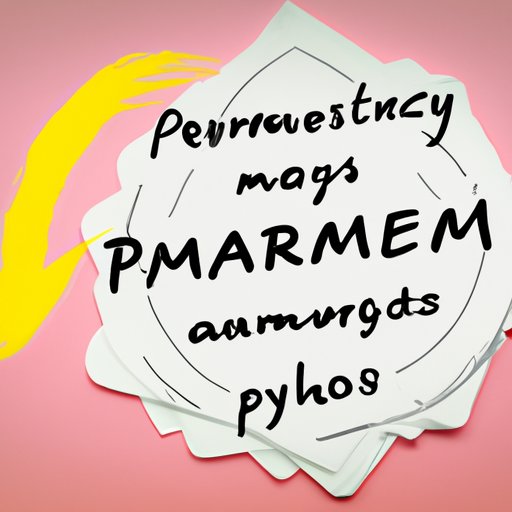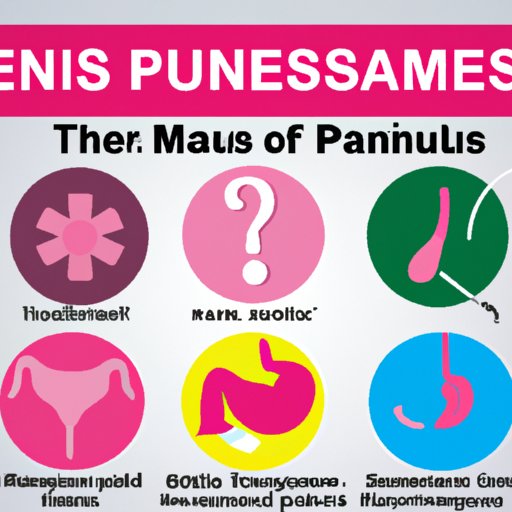
Is Nausea a Common PMS Symptom?
PMS or premenstrual syndrome refers to a group of symptoms that women experience before the start of their menstrual period. Hormonal changes in the body are the primary cause of PMS, and the symptoms range from mild to severe. While symptoms like cramping, mood swings, and breast tenderness are familiar with PMS, nausea is also a common occurrence. In this article, we explore why nausea happens during PMS and how to alleviate it.
The Relationship between Nausea and PMS Symptoms: What You Need to Know
PMS symptoms differ from one woman to another, and nausea is one of the symptoms that many women experience. Nausea often occurs alongside other common PMS symptoms like fatigue, bloating, and headaches. Although the causes are yet to be precisely understood, hormonal changes play a significant role in triggering PMS symptoms like nausea.
During the menstrual cycle, the levels of hormones like estrogen and progesterone fluctuate. These hormonal changes may affect the digestive system, leading to feelings of nausea and vomiting. Similarly, changes in another hormone, serotonin, may affect the brain’s function to cause nausea.

Understanding the Causes of Nausea During PMS: A Comprehensive Guide
Several factors contribute to nausea during PMS. While hormonal changes remain the primary cause, other factors like stress, dietary habits, and genetics may also contribute to this symptom. Some women who consume diets high in salt or caffeine may experience more severe PMS symptoms, including nausea.
According to research and expert opinions, the brain-gut interactions centered on hormones like estrogen and progesterone cause PMS-related digestive issues. Estrogen receptors in the gut help control gut motility, while progesterone receptors affect digestion and intestinal inflammation. Fluctuations in hormone levels during PMS may alter the gut’s reactions, leading to nausea, bloating, and constipation.
Coping with Morning Sickness During PMS: Tips to Help You Feel Better
Fortunately, there are several things women can do to alleviate nausea and other PMS symptoms. Here are some tips:
1. Exercise
Regular exercise helps your body release endorphins, which can improve your mood and reduce stress. You can engage in light exercises like yoga, walking, or swimming to help relieve your symptoms.
2. Diet
When experiencing PMS, it’s crucial to watch your diet. Avoid foods high in salt, sugar, and caffeine. Instead, consume foods rich in nutrients like fruits, vegetables, and whole grains. Additionally, drink lots of water, as this can help reduce bloating.
3. Medications
Several over-the-counter pain relievers like ibuprofen and acetaminophen can help relieve cramps and headaches. Antihistamines like Benadryl may also help relieve nausea and other PMS symptoms. However, consult your doctor before taking any medications.
4. Wristbands
Acupressure bands like Sea-Bands can also help alleviate nausea. These wristbands work by applying pressure to the P6 point on your wrist, reducing nausea and vomiting. They use your body’s natural pressure points to help you feel better.
Nausea and PMS: How to Manage Your Symptoms and Improve Your Quality of Life
Managing PMS symptoms is crucial for women’s quality of life. Women who experience severe symptoms should consider seeking medical attention to get appropriate diagnosis and treatment. Since PMS symptoms like nausea can impact your daily activities, it’s essential to prioritize your health and wellbeing.
If you experience severe PMS symptoms, you can seek support from loved ones, join support groups or seek counseling. Additionally, you can also explore treatment options like hormone therapy, antidepressants, or birth control pills. These treatment options can help ease your symptoms and improve your quality of life.
The Link Between Hormonal Changes and Nausea During PMS: What Science Tells Us
Research suggests that PMS symptoms like nausea and vomiting may be linked to hormonal changes during the menstrual cycle. When levels of hormones like estrogen and progesterone fluctuate, the digestive system may be affected, leading to bloating, cramps, and nausea.
Furthermore, studies have shown that selective serotonin reuptake inhibitors (SSRIs) can help alleviate PMS symptoms like mood swings, irritability, and depression. SSRIs work by enhancing serotonin levels, which can help reduce symptoms of nausea and vomiting.
Feeling Queasy and PMS: Exploring Your Options for Relief and Support
If you experience severe PMS symptoms, you may consider seeking medical attention for appropriate diagnosis and treatment. Birth control pills, antidepressants, and hormone therapy are viable treatment options for PMS symptoms.
Alternatively, you may consider exploring alternative remedies like acupuncture, herbal remedies, or aromatherapy. These remedies can help reduce stress and improve your mood, helping alleviate your PMS symptoms.
Natural Remedies for Nausea and PMS: Simple Solutions for a Common Problem
Several natural remedies can help reduce your PMS symptoms like nausea. Here are a few:
Ginger
Ginger tea or supplements can help reduce nausea and vomiting caused by PMS. Ginger has anti-inflammatory properties that help soothe the digestive tract, reducing bloating and cramping.
Acupuncture
Acupuncture is a traditional Chinese medicine therapy that involves inserting needles into specific points on the body. Acupuncture can help reduce stress and anxiety, leading to reduced PMS symptoms like nausea and vomiting.
Essential oils
Essential oils like lavender, chamomile, and peppermint can help reduce stress and anxiety, reducing your PMS symptoms. You can add these oils to your bathwater, inhale them, or apply them topically in a carrier oil.
Conclusion
PMS symptoms like nausea can be challenging to manage, but there are several options available. Understanding the causes and seeking appropriate diagnosis and treatment are crucial for relieving your symptoms and improving your quality of life. Additionally, practicing self-care like eating healthy, exercising, and seeking support can help you cope better with your symptoms.





